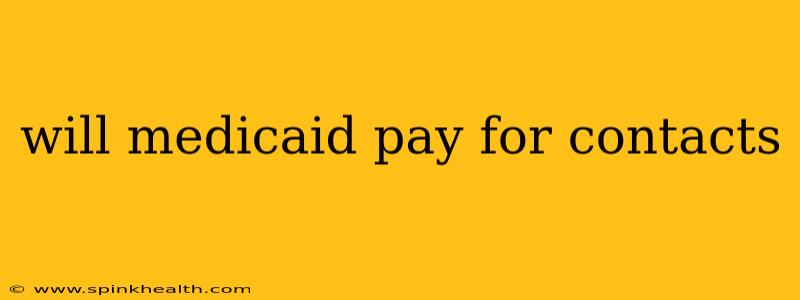Will Medicaid Pay for Contacts? The Winding Road to Clear Vision
The question of whether Medicaid will cover contact lenses is a common one, and unfortunately, there's no simple yes or no answer. It's a journey that depends on several factors, weaving together individual circumstances, state regulations, and the specific Medicaid program involved. Think of it as navigating a winding road, where each turn brings new possibilities and challenges.
Let's embark on this journey together, exploring the intricacies of Medicaid coverage for contact lenses.
What Factors Determine Medicaid Coverage for Contact Lenses?
The eligibility for Medicaid contact lens coverage hinges on several critical factors. It's not a one-size-fits-all situation.
-
State Variations: Medicaid is a jointly funded, federal-state program, meaning each state holds significant authority in determining its specific coverage guidelines. What's covered in one state might not be covered in another. This makes researching your state's Medicaid program essential. You'll find that some states offer generous coverage, while others are more restrictive.
-
Medical Necessity: This is arguably the most significant hurdle. Medicaid generally only covers contact lenses deemed medically necessary. This means your eye doctor must certify that eyeglasses aren't a suitable option for your specific vision needs. Conditions like keratoconus, severe astigmatism, or aphakia (absence of the eye lens) might qualify. A simple prescription for refractive error (nearsightedness, farsightedness, astigmatism) may not be enough.
-
Type of Contacts: Even if your doctor deems contacts medically necessary, the type of contact lenses covered might be limited. Medicaid may cover only the most basic types, potentially excluding specialized lenses like toric (for astigmatism), multifocal (for presbyopia), or colored contacts unless specifically medically justified.
-
Specific Medicaid Plan: The specific Medicaid plan you're enrolled in also influences coverage. Some plans may have more comprehensive vision benefits than others. Understanding the details of your plan is paramount.
How Can I Find Out If My State's Medicaid Covers Contacts?
This is where the detective work begins. You have several avenues to explore:
-
Contact Your State Medicaid Office: This is the most reliable source. Their website or phone number should be readily available through a quick online search. They can provide the definitive answer about contact lens coverage under your specific state's program.
-
Review Your Medicaid Plan's Summary of Benefits: Your plan's documentation should outline what's covered. This should be readily accessible online or through your provider.
-
Consult Your Eye Doctor: Your ophthalmologist or optometrist is knowledgeable about Medicaid guidelines and can provide insights into whether your specific condition might qualify for contact lens coverage.
What if Medicaid Doesn't Cover My Contact Lenses?
If your state's Medicaid program doesn't cover contact lenses, or if your medical needs don't meet the criteria, you're not without options:
-
Explore Private Insurance: If you have additional health insurance coverage, check its vision benefits to see if contact lenses are covered.
-
Consider Contact Lens Financing Options: Some eye care providers offer payment plans to make contact lenses more affordable.
-
Seek Assistance from Patient Assistance Programs: Some pharmaceutical companies and charitable organizations offer assistance programs that could help with the cost of contact lenses.
Can I use Medicaid to get an eye exam for a contact lens prescription?
This often falls under the broader umbrella of your vision care coverage. The answer is similar to contact lens coverage itself – it largely depends on your state's Medicaid plan. Some plans will cover comprehensive eye exams, including those for contact lens fitting. However, others might only cover specific types of exams, and you will have to confirm the details with your state's Medicaid office or your Medicaid plan provider. Always verify coverage before your appointment.
Navigating the world of Medicaid and contact lens coverage requires careful investigation. But by understanding the key factors and pursuing the right avenues, you can increase your chances of achieving clear and comfortable vision without financial burden. Remember, your state Medicaid office is your most valuable resource in this process.

